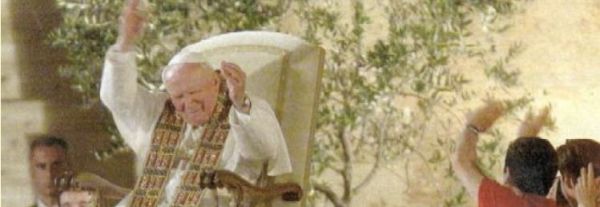Our gaze goes to Giulio Romano's painting above the high altar of this church: it shows the Holy Family, with John the Baptist still a child, the Apostle James and the Evangelist Mark, the latter already adults.
The Baptist briskly points with his left hand to the Child Jesus, depicted in his infantile weakness. To the question of the relatives and neighbours of Elizabeth and Zechariah: "What is to become of this child?" the painting seems to give us this answer: John the Baptist points with all his attitude to Jesus to the visitor James who is close to him; he bows deeply in the awareness of his littleness: I am not worthy to untie the strap of the sandal to him who comes after me, but who is before me. This word has nothing to do with false humility. The Baptist is too upright, too sober for that. He certainly recognised human helplessness better than most men.
The preacher of penitence who questions men in their innermost being, who shakes them out of their certainties and transforms them, who snatches them from the superficiality of a purely earthly materialistic attitude, still belongs to the Old Covenant, he is just the one who points the way to the Kingdom of God; and this Kingdom of God is near, one hears the voice of the one who calls in the wilderness. The Baptist's humility is authentic. But God exalted the littleness of the Baptist with the greatness of the task entrusted to him; indeed, he had already exalted him in his mother's womb: before he was even born, he was in fact already 'reborn' by the Spirit of Christ. Human greatness is nothing compared to the smallness that is called to participate in the greatness and holiness of God.
For us priests, John is a model. He seeks nothing for himself, but everything for the one he now points to. The child already represents in a certain way the word transmitted to us in the fourth Gospel: "He must increase and I must decrease" (John 3: 30). John was to lead men to Jesus and bear witness [...].
John and the story of his life are like a slide on which a name and a truth are indicated. It remains dark until a source of light is lit behind it. Thus says the Gospel of John: 'He was not the light, but he was to bear witness to the light' (John 1: 8). The light of God is decisive in his life and mission. By its light we become seers, to recognise God's will. This is often contrary to our desires and our own will. When it came to naming the newborn John at his circumcision, tradition was decisive: he would receive his father's name. But Elisabeth decided otherwise. She knew God's will and gave the child the name 'John', which means 'God is merciful'.
Why should it have been so only then?
We can all experience the power and goodness of God in our lives when we trust in him and strive earnestly to do his will. But this requires from us humility and the realisation that man does not possess the measure of all things. We cannot see ourselves as the yardstick of every thought, every morality and every right. We too easily succumb to the belief that everything can be made, heaven as well as earth, indeed man himself, according to our own image and likeness.
[Pope John Paul II, S. Maria dell'Anima homily 24 June 1990].












